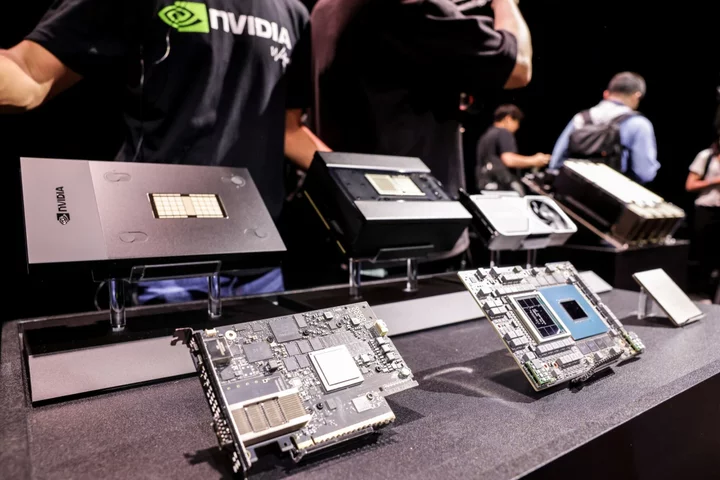One of China’s emerging artificial-intelligence startups went on a buying blitz earlier this year to make sure it had enough high-end Nvidia Corp. semiconductors, before the US government imposed tighter export restrictions that cut off such chip sales to all Chinese customers.
The startup, 01.AI, bought enough of the chips to last for the next 18 months or so, founder and Chief Executive Officer Kai-Fu Lee said. Nvidia’s graphics processing units, or GPUs, are considered the most advanced for training AI models, like OpenAI’s GPT4.
“We have stockpiled a lot of Nvidia chips,” said Lee, during a Bloomberg Television interview on the sidelines of Bloomberg’s New Economy Forum. The 61-year-old, who is also CEO of venture capital fund Sinovation Ventures, founded 01.AI earlier this year and helped push its valuation to more than $1 billion in less than eight months.
China’s Communist Party is leading an investment blitz to develop its own advanced semiconductor capabilities as the US government cuts off the supply of chips and chip-making equipment, but Lee said it’s unclear whether the country can build the requisite technologies before companies like his run out of foreign supplies. Semiconductors are at the foundation of the technology industry, the essential building blocks for everything from AI and smartphones to military applications.
“The jury is out on whether China in 1.5 years can make equivalent or nearly as good chips,” said Lee, a four-decade veteran of AI who previously worked at Apple Inc., Microsoft Corp. and Google’s China unit.
He called the rising tensions between the US and China regrettable, and predicted it would further divide the technology world.
“We will have two parallel universes,” he said. “Americans will supply their products and technologies to the US and other countries and Chinese companies will build for China and whoever else uses Chinese products. The reality is that they will not compete very much in the same marketplace.”
01.AI just introduced an open-source large language model called Yi-34B, which outperformed leading open-source rivals such as Meta Platforms Inc.’s Llama 2 on certain metrics, according to Hugging Face rankings. The startup anticipates offering proprietary versions of the LLM to paying customers, as well as applications, so it can generate revenue in the future.
“We expect very significant revenue next year” after “next to zero” this year, Lee said in a separate interview at the event.
Building AI models is very expensive, Lee said, because you have to spend millions on chips to make technology better. But there’s no alternative because there is a direct correlation between money spent on GPUs and the performance of products. 01.AI raised money from Alibaba Group Holding Ltd.’s cloud unit and borrowed from Sinovation ahead of that to buy chips.
“The best strategy is to be on a constant, rolling fundraising for large language model generative AI companies,” he said. “Every time money’s being raised a significant portion, perhaps three quarters, are being put into buying GPUs.”
“We as mankind have never seen a technology which automatically becomes smarter every time you throw more GPUs at it,” Lee said. “That is a constant, never ending. And as long as that GPU is being translated into more intelligence, and as long as the more intelligence is being translated to profitable applications, the virtuous cycle continues.”
--With assistance from Francine Lacqua and Yvonne Man.

